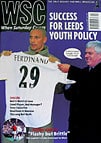 Goals and wins are what the game's about. So hit it long, says Matt Nation
Goals and wins are what the game's about. So hit it long, says Matt Nation
There must be thousands of people throughout the world whose favourite sporting event is the 25-kilometre walk. They could probably sit you down and explain the whole shebang of pacing techniques, ball-heel rolling and the inability of those participants who have been disqualified to leave the course without having to be clubbed into submission by stewards.
For most of us, however, it’s unnatural. It’s not so much the Pink Pantheresque stature of those involved or even facial expressions that are normally only seen on recipients of a particularly boisterous body search at an international airport. It’s the fact that, although taking part in what is ultimately a race against time, walkers are not allowed to go as fast as they can.
From a spectator’s point of view, the short-passing game is football’s equivalent of watching people waggling their backside and looking at their watch every five minutes. There is no denying that it is football at its artistically purest and that a goal resulting from a string of passes is much more satisfying than Pat Jennings ballooning a drop kick over Alex Stepney’s head. Nonetheless, join-the-dots football has never had people on the edge of their seats in the same way as end-to-end stuff does.
Of course, there is enough superficial evidence to disprove this. One only needs to recall the famous footage of Leeds against Southampton in the Seventies, where the Yorkshiremen embarked upon a spot of pig-in-the-middle that even Jackie Charlton managed to get involved in. However, it is famous not least because it is shown so often, which begs the question as to whether there is any other footage of any other team doing the same thing. Secondly, it lasts for two minutes, top whack. If Leeds had carried on taking the rise for much longer, the supporters’ jeering would most likely have been directed at their own team rather than their opponents.
Then there are Wimbledon, the time-honoured proponents of the sabre-rattling welt down the middle. It is very easy to mention long-ball tactics in the same sentence as meagre, four-figure crowds, fold one’s arms and smile triumphantly. But that is to assume that the reasons that people in that part of London go, or don’t go, to football are different to those of fans anywhere else. And there are very few people who start supporting teams because of length and frequency of their passes. Liverpool, for example, acquired their enormous fan base all those years ago because they won everything in sight, not because Hansen and his defensive cohorts pushed the ball around with all the fervour of a recalcitrant child playing with his Brussel sprouts at the dinner table.
If anything, motives for going to football would rudely dislodge the aureole surrounding the short-ball game. In this cut-throat, performance-related age, those people who feel the need to actually describe why they go to football often find themselves using the word “escapism”. If this really does apply, then short-ballers should start changing the direction that they’re running in. You don’t flee the pressure of, for example, flogging non-interest-bearing discount bonds or distorting sales targets by paying to watch footballers applying the slide-rule accuracy of a bunch of over-fastidious topiarists; as with any form of escapism, you want to see people giving it a bit of welly, you want Hulk Hogan rather than Gary Kasparov. In the post-Nevin, pre-Hoddle days at Chelsea, a friend of mine admitted that, on occasions, the only thing he looked forward to was Dave Beasant kicking the ball the length of the pitch.
The false front put up by the short-ballists calls to mind Mark Twain’s claim of a classic being “something that everybody wants to have read, but that nobody wants to read”. And watching a team zinging the ball about by their own corner flag is much more demanding than seeing a centre-half – or, even better, a goalkeeper – being stuck up front for the last five minutes. Art for art’s sake and all that, but it is on route one that a lot of people, despite their good intentions, still get most of their kicks.
From WSC 167 January 2001. What was happening this month